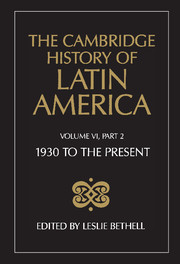1 - State organization in Latin America since 1930
from Part One - State
Published online by Cambridge University Press: 28 March 2008
Summary
INTRODUCTION
This chapter surveys more than half a century in the development of state organization in twenty formally sovereign republics of Latin America. As a historical survey rather than an exercise in abstract theory, it pays attention to the particularities of individual cases, while of course seeking to place them in their comparative context. A number of specific aspects of state organization — territorial control, public employment, fiscal capacity, scope of economic regulation, and accountability to the citizenship — will be singled out for attention. The aim is to isolate the main long-run trends in state organization in Latin America since 1930, and to formulate some generalizations about their determinants. Clearly, we must consider not ‘the Latin American state’, but a range of state organizations in Latin America responding to quite varied conditions with respect to economic development, to geopolitical location and to socio-political context. However, there are some important limits within which these variations occur, and rather than thinking of twenty totally distinctive national experiences we can identify several clusters of states with sufficient similarities to permit commonality of treatment. But first a number of caveats are in order. This is not another account of the development of state capitalism (although all the countries under consideration developed forms of state organization intended to mediate the crucial relationship with the capitalist world market). Limitations of space have prevented much consideration of the varying ideological climate within which state organization has been shaped since 1930. In particular, changing doctrines of, and attitudes towards, nationalism would merit closer closer attention than they can receive here.
- Type
- Chapter
- Information
- The Cambridge History of Latin America , pp. 1 - 96Publisher: Cambridge University PressPrint publication year: 1995
References
- 7
- Cited by

